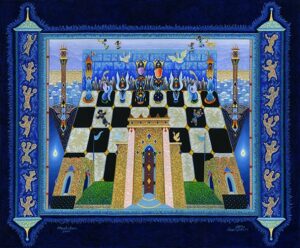בס”ד
By Rabbi Moshe Goodman, Kollel Ohr Shlomo, Hebron

This parsha, Tetzaveh, often coincides in most years with shabbat Zachor, when we read about the obligation to obliterate Amalek (although it does not coincide this year). One meaning we can gather from this is that parshat Tetzaveh is involved greatly with the spiritual value of clothes, i.e the clothes of the Kohen, and when we examine the Divine significance of clothes by Hashem so-to-speak we find that Hashem is “clothed” with clothes of vengeance against our enemies, as the verse says “who is coming from Edom with colored garments… who is this, robed in splendor, striding forward in the greatness of his strength? “It is I, speaking in righteousness, mighty to save.” Why are your garments red, like those of one treading the winepress? “I have trodden the winepress alone; from the nations no one was with me … I trampled them in my anger and trod them down in my wrath; their blood spattered my garments, and I stained all my clothing. For the day of vengeance was in my heart, and the year of my redemption has come, etc.”
This painting describes the power of holiness and good against the powers of evil, as if in a game of chess. The conception of this battle as a “game”, so-to-speak, reflects a deep idea that the Creator not only oversees but also created and enlivens both good and evil and all is like a “game” before Him, meaning also that the manner of battle between good and evil is like a “game” in which the power of good is meant to exert itself in order to overcome the powers of evil, and Hashem does not give the good this challenge if not that the good has the ability to win over evil, and that ultimately at some point the good will be triumphant. We have the choice whether to bring this victory soon in our days with kindness and mercy or God-forbid lose the opportunity now, but yet still good will be triumphant at some point even through many trials and through the attribute of judgment. This is hinted in Mordechai’s words to Ester “do not deem in your heart that you shall relieve yourself in the king’s house from all the Jews, for if you be silenced now, yet still salvation shall come to the Jews from a different vintage, but you and your father’s household shall be diminished, for who knows perhaps for this you have become queen.” Therefore, especially at this time when Israel is at war with the powers of evil let us read these words of the Megila as pertinent to ourselves to seek how we can aid in Israel in this war. There are many facets to this war, and everyone whether in Israel or abroad can play an important part in winning this war.
We see in in this painting seven hasidim to each side of the Torah scroll, the special Jewish number. The Beit Hamikdash can be seen as the organization of sanctity and good and therefore it is seen as the opposing power to evil here. Hebron as well is an important step towards the Beit Hamikdash as we see that King David ruled in Hebron first and then in Jerusalem, paving the way towards the Beit Hamikdash.



